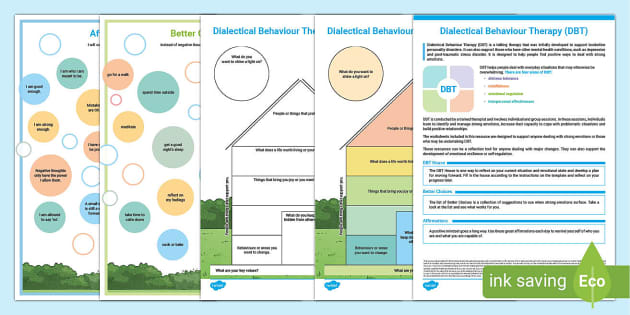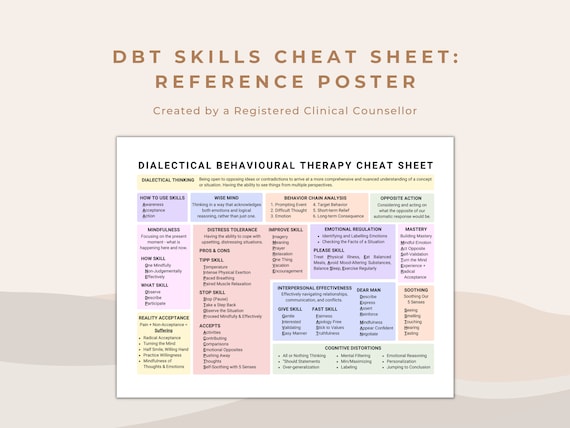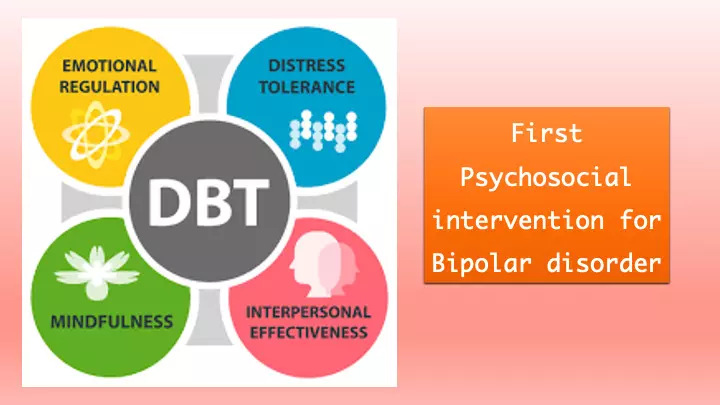DBT London: Where Hope and Recovery Intersect for Lasting Change
Wiki Article
Empowering Individuals Through Effective Dialectical Behavior Treatment (DBT) Providers: Structure Stronger Mental Health Foundations
In the realm of mental health and well-being, the importance of equipping individuals through efficient Dialectical Behaviour Treatment (DBT) solutions can not be overemphasized. By focusing on the core principles of DBT, such as improving emotional guideline skills, improving interpersonal efficiency, developing distress resistance strategies, and cultivating mindfulness techniques, people can start a trip in the direction of building more powerful psychological wellness structures. The effect of DBT surpasses simple sign management; it supplies an alternative approach that furnishes individuals with the tools needed to navigate life's difficulties with durability and self-awareness. As we explore the transformative potential of DBT in equipping individuals to lead more satisfying lives, the path to improved psychological health and wellness and wellness ends up being an engaging narrative that bids expedition.Recognizing the Core Principles of DBT


One core concept of DBT is recognition. Another essential element is dialectics, which educates individuals to watch situations from numerous viewpoints and discover the synthesis in between contradictory thoughts or feelings.
Furthermore, the concept of dialectical abstinence is central to DBT. This principle motivates people to abstain from self-destructive actions while also approving themselves. By understanding and including these core principles, therapists can efficiently implement DBT techniques and support individuals in their journey towards psychological regulation and mental health.
Enhancing Psychological Regulation Skills
Creating efficiency in taking care of emotions is an essential element of cultivating psychological well-being and interpersonal efficiency - DBT London. Enhancing psychological law abilities is a core part of Dialectical Practices Treatment (DBT) that furnishes people with the tools to browse extreme feelings in a positive and healthy fashion. Via DBT, individuals find out to recognize, recognize, and control their feelings, resulting in improved psychological wellness resultsDBT stresses the relevance of mindfulness, which entails being existing in the moment without judgment. This method enables people to observe their emotions without becoming bewildered by them, improving their ability to respond effectively instead of react impulsively. By growing mindfulness, individuals can establish a better feeling of self-awareness and psychological control.
Furthermore, DBT shows useful abilities such as distress tolerance and emotion guideline methods to aid people handle tough emotions. By learning these abilities, people can decrease spontaneous habits, improve decision-making, and enhance their connections with others. Eventually, improving emotional regulation skills with DBT encourages people to lead even more satisfying and balanced lives.

Improving Interpersonal Performance
Having developed a solid foundation in psychological guideline abilities within the framework of Dialectical Practices Treatment (DBT), the focus now moves towards improving social effectiveness. Improving interpersonal effectiveness is a critical component of DBT as it furnishes people with the essential skills to navigate social communications, connect efficiently, set boundaries, and construct much healthier connections.
In DBT, interpersonal performance abilities are instructed via components that focus on areas such as assertiveness, efficient interaction, and interpersonal problem-solving. By finding out these skills, people can improve their capability to reveal their wishes and requirements, maintain self-respect, and develop more powerful links with others.
Practicing mindfulness is an integral part of improving interpersonal effectiveness within the DBT framework. Mindfulness enables individuals to be present in their interactions, pay attention proactively, and react thoughtfully as opposed to respond impulsively. By incorporating mindfulness into their every day lives, individuals can grow better self-awareness and emotional policy, which are vital for effective social communications.
Structure Distress Resistance Methods
Discovering reliable approaches for taking care of emotional distress is crucial for individuals looking for to improve their coping abilities and resilience. Structure distress resistance strategies is an essential facet of Dialectical Practices Therapy (DBT) that equips individuals to navigate challenging feelings without becoming overwhelmed.Furthermore, mindfulness techniques play a significant function in building distress resistance. Mindfulness motivates individuals to stay existing in the minute without judgment, allowing them to observe their ideas and emotions without reacting Get More Info impulsively. This awareness makes it possible for individuals to tolerate distress a lot more successfully and establish a better feeling of control over their responses.
In addition to these strategies, creating a personalized distress resistance plan with the assistance of a qualified therapist can give individuals with a customized method to managing psychological distress - DBT London. By including these approaches into life, people can strengthen their psychological wellness foundations and improve their general health

Cultivating Mindfulness Practices
To strengthen their distress resistance strategies even more, individuals can concentrate on growing mindfulness techniques as a corresponding approach within the structure of Dialectical Behavior Treatment (DBT) Mindfulness, an essential part of DBT, includes paying focus to today minute without judgment. By promoting mindfulness, people can boost their understanding of thoughts, feelings, and physical feelings, advertising a deeper understanding of themselves and their experiences.Mindfulness techniques in DBT include methods such as conscious breathing, body scans, and observing ideas without add-on. These practices motivate people to develop a non-reactive stance in the direction of their inner experiences, enabling them to react to difficult scenarios with better clarity and composure. By incorporating mindfulness into daily regimens, people can learn to regulate their emotions a lot more properly, decrease impulsive habits, and cultivate a sense of inner tranquility.
Through cultivating mindfulness methods, individuals undertaking DBT can build a strong foundation for managing anxiety, enhancing connections, and enhancing total health. By integrating mindfulness into their therapeutic trip, individuals can establish important abilities that encourage them to browse life's challenges with strength and self-awareness.
Conclusion
In final click here for info thought, reliable Dialectical Practices Treatment (DBT) solutions play a crucial role in encouraging people to construct more powerful mental wellness foundations. By comprehending the core concepts of DBT, enhancing psychological policy abilities, enhancing interpersonal effectiveness, building distress resistance techniques, and growing mindfulness techniques, people are equipped with the necessary tools to navigate their emotions, relationships, and difficulties in a more flexible and resistant manner. DBT services use a thorough strategy to advertising psychological health and equipping people to lead satisfying lives.By concentrating on the core principles of DBT, such as enhancing psychological guideline abilities, boosting social effectiveness, developing distress tolerance strategies, and cultivating mindfulness practices, individuals can embark on a trip in the direction of building more powerful psychological wellness structures. Enhancing emotional policy abilities is a core part of Dialectical Behaviour Treatment (DBT) that equips individuals with the devices to browse intense feelings in imp source a positive and healthy manner.Additionally, DBT teaches useful skills such as distress tolerance and feeling guideline strategies to aid people manage difficult feelings.To deepen their distress resistance techniques additionally, people can focus on cultivating mindfulness methods as a complementary technique within the structure of Dialectical Behaviour Treatment (DBT) By understanding the core concepts of DBT, improving emotional policy abilities, boosting interpersonal effectiveness, building distress tolerance methods, and growing mindfulness practices, individuals are outfitted with the required tools to browse their emotions, connections, and challenges in a more resistant and adaptive manner.
Report this wiki page